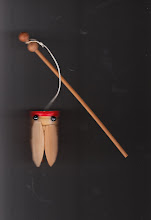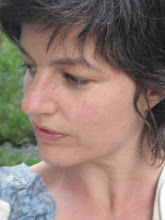
I’m sleeping on the bottom of a bunk bed, under this pile of boxes. I will get braver, later, and dig into the boxes, and find another girl’s dolls and stacks of love comics from the 80’s. Okasan is hammering on the bedroom door.
Good Morning, Good Morning. Come here please. Now. Do you see Mt Fuji?
I get up, pull on clothes, and follow her out across the Astroturf. Together, we lean and twist out over the aluminium railings. In winter, when the mountain is white, she will ask her friends from Shizuoka to come and look. They have good houses, but they don’t have this.
I’ve been here two weeks, breathing under blanket grey sky, sweating like the town chimneys (red white striped one for every day of the year), swallowing the heat and haze that hid the mountain. Everything seemed melted, rock spirited away by shadowy vapours. Now the sun is tired and the wind is more restless than it was, the volcano is getting back its substance.
It bores me to write about what comes next. I’m not bored at the time, but it’s a lock down stage. I am under complete control. I am fed, I sleep, I sweat out surreal dreams, follow the routines in this house, in this place that so badly wants to take me in. And I so badly want to be taken in.
Fujiko gets up at 5.30am to start cooking asa gohan and obento. The rice is done overnight in the timed cooker, but miso soup must be made fresh. There is fish to be fried. The lunchbox must hold a selection of meats and vegetables, cooked separately and arranged attractively next to the rice, then left to cool for at least half an hour, to stop the whole thing stewing in its Tupperware. I am eating the things left over from the obento. I can use chopsticks, but Fujiko is not pleased with the way I hold my fingers. She rearranges them and this makes me fumble and drop my food.
It is better, she says, to struggle and try to do the right thing than it is to be comfortable in the wrong way. This is a saying. A kotowasa. I hear a lot of these things. They fall into me like boulders, each to be taken very seriously. It’s part of the decision.
Before Fujiko serves rice from the steamer she holds up a bowl.
Kore wa nan desu ka? she asks.
Cha wan desu. I say.
When she heard I was coming, she says, she went to the cha wan shop and she chose this specially for me. Pink, white, green, floral, girly. Not me. Me now.
She points to the soy bottle.
Shoyu desu.
Coppu. Sara. Osara. Hashi. Not words or text. Sounds and things. Two weeks in this place, and I am two weeks old.
She serves me cold tofu with spring onions and dry fish flakes.
Your eyes are not open. Please eat this cold food.
I wake up.
Long metal washing poles are set on stands along the edges of the roof, skirts and shirts and trousers are threaded and pegged neatly along them. Plastic hangers are clipped to the poles, dangling socks and underpants and towels. They flap. We tug the clothes when they are wet, to remove the creases. We hang them inside out, to slow fading. Today is fine, so the futons are draped out on the balcony rails, to make them fresh. They must come in before the sun goes down. Like me. It will be good to fall into the quilts, truly tired, smelling sunshine.
Later, I drag the futons into the house and fold them up in their respective bedrooms. The clothes go into a heap in onichan’s room, where I kneel on his tatami mats, facing the Numazu highway, Fuji San behind me. Afternoon light flows through the sliding glass doors. Shoulders together, torsos folded, crotches up, hips tucked, legs creased, ankles rolled. Only a dead man wears unfolded clothes. Otosan wears long legged underwear and his business whysutsu are left out for the iron. His sons wear silky boxer shorts. Fujiko has rubberised girdles and her cotton underpants seem incredibly small. The laundry is now ordered into pleasing piles, according to wearer. I feel something like love as I’m putting the clean towels on the little shelf outside the bathroom.
It surprises me that I’m pleased. I’m a drop and shop girl. My routine is to wear stuff until the stink manages to overcome my Marlboro blasted senses, or until the outfit falls apart. Then I throw it in a heap to marinate for a few months. In the meantime, I buy more two-dollar dresses from the charity shop and the cycle continues, until the marinated objects are mysteriously clean again or their deconstructed status says something I want to say.
Back in my room, and sitting at ease in the space after house work, I take the letter out of my pocket, unfold it, and read it again. When the doorman was nineteen, he climbed this volcano, saw the sunrise and looked down on this place. His body has travelled the Tokaido Sen.








No comments:
Post a Comment